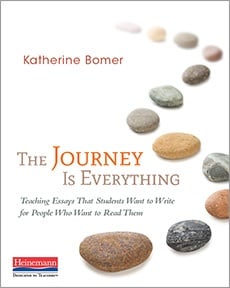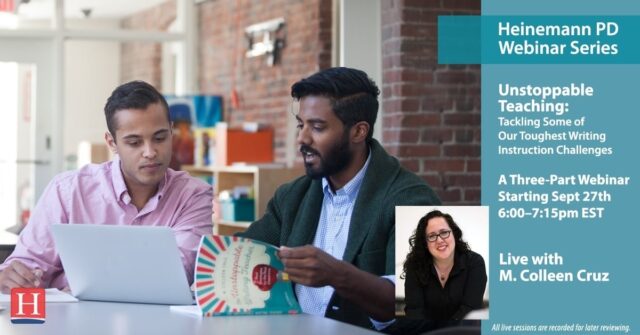
Adapted from the introduction to The Journey Is Everything, the newest book by Katherine Bomer.
By Katherine Bomer
Whole generations of adults fear writing because they grew up in schools thinking writing means sentence diagrams, penmanship, spelling, and proper placement of that darn thesis statement. Our students deserve better than this. They need essays to help them think in reflective, open-minded ways, to stir their emotions, teach them about life, and move them to want to change the world. And now more than ever, with the hyperattention paid to preparing students for college and careers, young people need practice in finding subjects of interest and passion to write about. They need lessons that show them how to think deeply about these topics and how to write about them in compelling ways.
My dream in this book is to occupy essay! I want to reboot the original name of it—essais: little attempts, experiments, trials—and bring essay writing back to its exploratory roots. I want to take the noun, essay, and convert it to the verb, essaying, as Paul Heilker suggests, to describe the trying out we do when we write. When I sit beside students in writing workshops and ask, "What are you working on in your writing?" I hope to hear something like one of my former fifth grader once said: "Well, I'm essaying how it's weird that all us kids are friends and work together in this class, but at lunch, we sit in little groups with our own... um... colors... races?... and stuff. And does that mean those are our real friends and not the ones in class? And why do we do that?"
—
essais: little attempts, experiments, trials
—
In The Journey Is Everything, I'll ask you to occupy beautiful and brilliant essays, what Robert Atwan calls "the sparkling stuff" featured in his annual Best American Essays series, to create possible models for how to teach essay in ways that will let students discover what they think and what they want to say. Beginning in Chapter One, you'll read closely two spectacular examples by Brian Doyle and Dagoberto Gilb just to see and hear and be moved, and to say, "Ah, this. This is it!" Chapter Two defines explicitly what essay is and is not; then in Chapter Three, I use excerpts from published essays to name specific craft features you can show students. Also, I suggest how to help students read mentor texts to develop their own definitions of essay.
The chapters in Part Two of the book will show you how to teach students to develop ideas into essays. We'll explore the writer's notebook as a place to generate, store, and experiment with material and then as a place to collect thinking and thickly texture the material to elaborate an essay idea. Chapter Six offers strategies for the move from notebooks to first drafts, and then Chapter Seven shows how to help students revise drafts and find a shape and structure without formulas.
As you consider how to teach your students to write essays, I invite you to write along with them because being a writer of your own essay will anchor your understandings and your knowledge of the content and process of writing. You can teach from "what writers really do," a phrase I borrow from Dorothy Barnhouse and Vicki Vinton, authors of What Readers Really Do, who argue so eloquently for teachers to look to our own reading experiences to know how to teach reading. Our authentic experiences "need to serve as our rudder as we navigate through curricula and standards, data and assessments" (46).
In Part Three of the book, I show how practicing essay writing can indeed lead to powerful and well-written academic writing, and I explore assessment that honors the essay's open-ended and organic essence. Finally, in the Afterword, I cap off my argument and sound a clarion call for making time to write essay in schools.

The Journey Is Everything: Teaching Essays That Students Want To Write For People Who Want To Read Them is out now. Learn more about it here.
♦ ♦ ♦ ♦
 Katherine Bomer is an internationally known writing consultant and frequent keynote speaker, whose career began with the Teachers College Reading and Writing Project. She is the author of Hidden Gems and Writing A Life, and coauthor of For A Better World.
Katherine Bomer is an internationally known writing consultant and frequent keynote speaker, whose career began with the Teachers College Reading and Writing Project. She is the author of Hidden Gems and Writing A Life, and coauthor of For A Better World.


